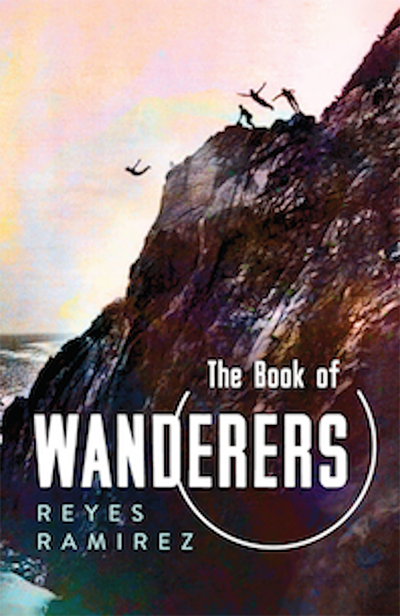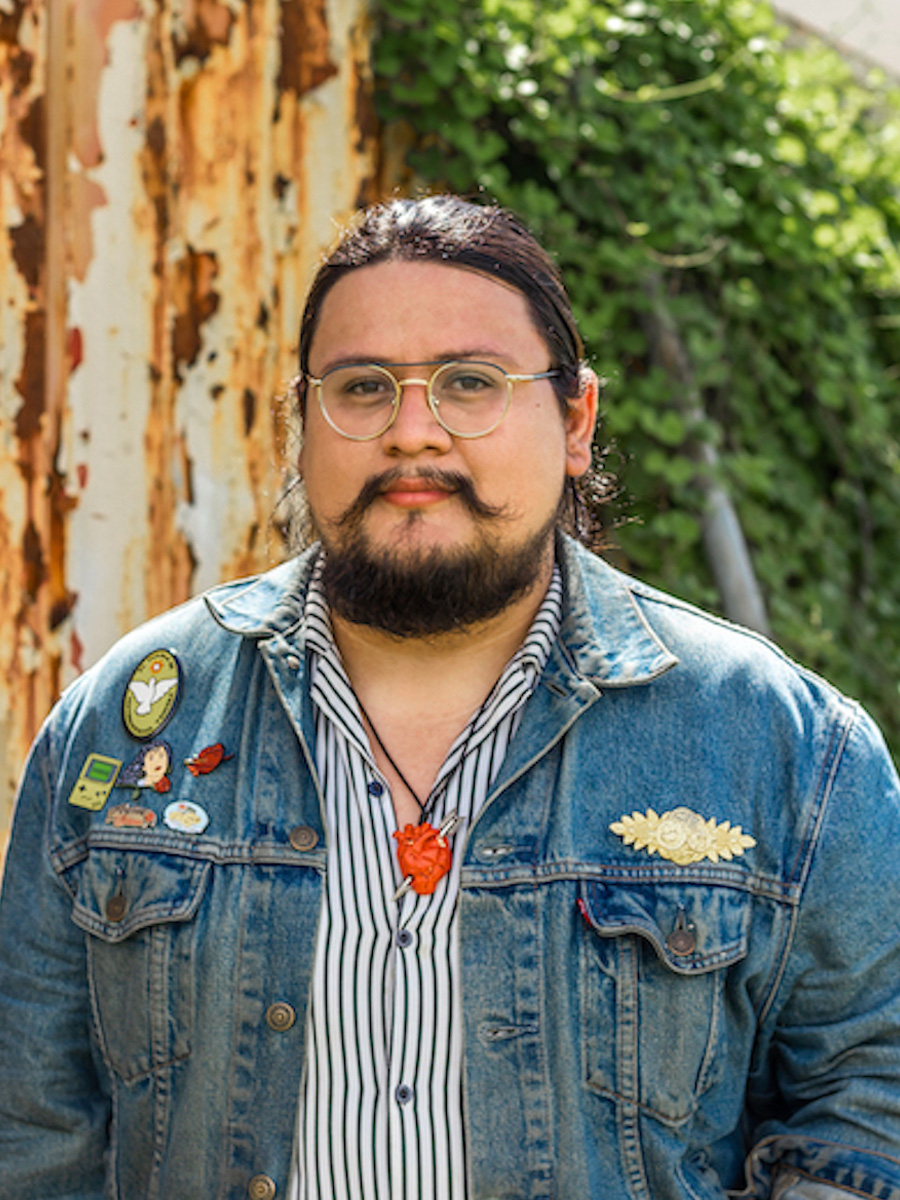Tell me about yourself.
I’m Reyes Ramirez, a born-and-raised Houstonian writer, curator, organizer and educator
of Mexican and Salvadoran descent, who has two books. The first is “The Book of Wanderers,”
a collection of short stories in the Camino del Sol series spotlighted by University
of Arizona Press, and “El Rey of Gold Teeth,” a book of poetry from Hub City Press.
I’m also currently curating an online exhibition focusing on Houston artists of color
and the use of grids with an Interchange Artist Fellowship from M-AAA and The Warhol
Foundation’s Idea Fund.
How did you know you wanted to be a writer?
I was surrounded by a language that didn’t reflect who I was as a person, if that
makes sense. “Spanglish” is an often derided and suppressed language in America, even
though it is the natural step forward for people having to navigate English and Spanish,
especially immigrants from predominantly Spanish-speaking countries. I had to weave
between the two languages all my life; yet no one in school allowed me to speak both
at once as I had to with my family and community. Thus, when I seriously considered
my career path in undergrad (as a double major in political science and creative writing),
I knew that this unique imprint in my writing was something I could control and grow
with rather than having to be controlled and/or silenced. In my school assignments,
I was limited; in my writing, I could do what I wanted. It was that freedom that led
me to wanting to be a writer, so that I could inspire others to explore and be free
in their own way.
I read in your bio that you are a UH alum from the class of 2012. Why did you choose
to work at UH after college?
It was a long journey to work at UH! I graduated with a B.A. in political science
and creative writing in 2012 and went to Texas State University for my MFA in fiction
writing, which I graduated from in 2015. I came back to Houston and worked in various
roles with several non-profits and educational institutions, including but not limited
to, DiverseWorks, Writers in the Schools, Houston Community College, Arte Público
Press, Fresh Arts and more. It wasn’t until late 2021 that I was hired at UH as a
program manager for the Inter-University Program for Latino Research housed at the
Center for Mexican American and Latino Studies, which was perfect. I feel all my experience
and skills can really grow here, just as they did when I was an undergraduate.
Do you think UH helped you to reach all the achievements that you have so far? How?
UH helped set me on track to become the writer I am today through meeting amazing
people, particularly friends I still know and love to this day. Being able to take
workshops and classes with professors that introduced me to knowledge I didn’t have
before and presenting a diverse environment where there wasn’t any one solution to
a problem, UH provided me with opportunities to learn and cultivate my talent in ways
that continue today. I think that if I hadn’t gone to UH for undergrad, I wouldn’t
be as far into my craft as a writer as I am now.
How has your experience working at CMALS influenced/impacted your writing?
I didn’t formally work at CMALS until late 2021, but my time as an undergraduate and
visiting and studying at CMALS was integral to my writing. Whether it was taking film
or literature courses that centered Mexican American experiences or helping to save
the “Chicano Mural” at the University Center, I didn’t have a language for my creative
identity until I was empowered by many mentors, including the iconic Dr. Tatcho Mindiola.
Unfortunately, my K-12 education did not feature any Latinx writers. Centers and fields
of study that focus on marginalized groups must be supported because they are very
important. CMALS really changed me.
What was the inspiration behind writing “The Book of Wanderers”?
Living in Houston, one of the largest and most diverse cities in America, as the son
of immigrants really allowed me to experience our city and country in a way that revealed
its glory and violence. I witnessed the many histories we inhabit, whether it be labeled
the South, Gulf Coast, Southwestern, borderlands etc. and the ways different people
navigate those identities. As someone who had to go between these many histories and
identities, I felt that I both belonged and didn’t belong, that moving between homes,
spaces and even countries could define a life. The idea of wandering and the movement,
figuratively and literally, required to exist in a nation that requires constant labor
to be maintained astounded me. Thus, “The Book of Wanderers” explores notions of belonging
and home, that those aspects of the human experience can be fulfilled in different
ways even though the environment isn’t conducive to feeling safe or stable. What does
it mean to make the self from constant erasure and upheaval? Can one be a fully realized
person when the mirror you look into is broken?

What do you want your readers to get from the book? What is your intended message?
I want my readers to be enlightened, entertained and marveled. I use different genres
and languages to create engaging narratives that center characters in ridiculous situations
for better and worse. Whether it be a family of luchadores, a curandera, a furniture
store employee, a mecha soldier, a runaway teen or even someone surviving in the zombie
apocalypse, I hope that my readers see these characters as dynamic, full people even
though the world around them is fractured. If I were to articulate a message, I think
it’d be that we, as a community, must work and heal together to combat injustice and
the cycles of systemic trauma.
Where were you when you found out that your book would be published in the Camino
del Sol series by University of Arizona Press?
I was at home when I received the email that the incomparable Rigoberto González had
chosen my book to be a part of the Camino del Sol series. It’s an unfathomable honor
that my first book is in the same catalogue as Juan Felipe Herrera, Urayoán Noel,
Carmen Giménez Smith, Luis Alberto Urrea, Daniel Chacón, Richard Blanco and more.
I’m still processing it all, that my words will be in the hands of readers with support
from a monumental literary history.
Why do you think it is important to share these stories with people in the community
and the rest of the world?
Houston is never given its due as a literary city that blooms amazing prose writers
like Bryan Washington, Attica Locke, Jasminne Mendez, Mario Alberto Zambrano, Gwendolyn
Zepeda etc. We’re a major American city with a rich arts scene worthy of more attention
and stories. Especially as a Latino writer in Houston, the American literary imagination
has barely scraped the surface of this cosmopolitan metropolis that encompasses the
urban, suburban and rural with connections to the cosmos through NASA. I wanted to
capture as much of that magic in this book and share it with other Houstonians and
the world to help elevate and introduce others to the amazing art and writing being
done in my city that can’t be made elsewhere.
Anything else you would like me to know?
You can order the book here: https://uapress.arizona.edu/book/the-book-of-wanderers.


